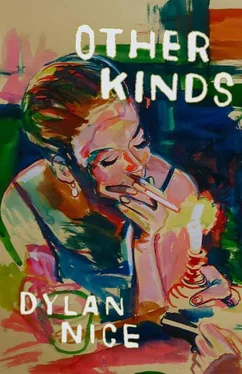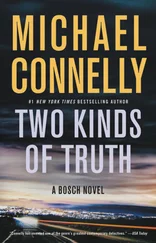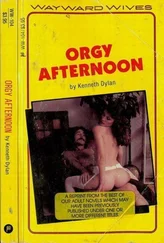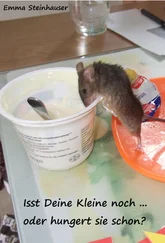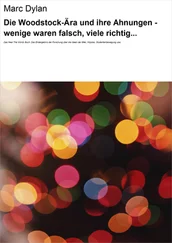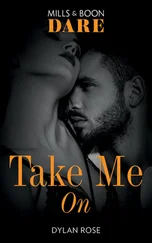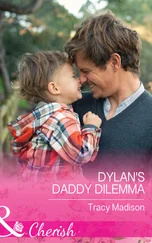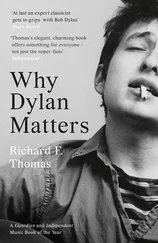“Where you’re from becomes part of your identity,” I said. “You don’t want to lose it. You protect it.”
“Do you protect yours?”
“I’m very scared of becoming someone I’m not,” I said.
I could talk to Nina. I could talk to her until my hands shook and my mouth dried.
The money felt strange in my hands. And there was always that plant outside our building. The plant that smelled worse than rot because of something sweet in the stink.
I drank and slept and gave the dorm room my smell. We left the university for the boat early the second morning.
Fruit hung from a net on the deck. We sat along cushioned seats below the masts. The sun was bright and strong but the air stayed cool. The boat took us to patches of coral along the edges of islands. I breathed through a snorkel and watched bright fish swim away from us. Orange coral swayed in water I couldn’t feel moving.
We spent a lot of time sailing. There didn’t seem to be a definite date or clock. You moved through a landscape that made motion nearly irrelevant.
I swam off the boat alone — the water was clear all the way until it turned a bright shade of green. I hung off the anchor’s chain and tried not to hear the people near the railing. Back on deck there was the heat and I felt swelled. I let the salt make my skin stick.
Nina slept and darkened — she lay on her stomach, the line of her moving with her hair.
The deck was planked and warm on my feet. Her body took the posture of someone with nothing to say. I sat next to her. She faced the water.
“I think I could live anywhere in the world,” she said.
“I feel loyal to where I’m from.”
“What do you want there?”
“The ugly things.”
“I want to be comfortable,” she said, “with my family around me.”
She was healthy and pleased. I convinced myself the rest of them there were like her, washed and calm and without emergency.
We anchored off an island called Palm. A few buildings looked small and pink on the edge of the beach. The masts of a sunken fishing boat were marked by a buoy. I sat on deck and waited for the skiff to take us to the island. Nina moved past me and breathed heavy.
“What are you thinking about?” I asked.
“Nothing,” she said.
“You were sighing,” I said.
The skiff pulled alongside the boat and she got in.
There was a poverty and stagnation that came off the concrete buildings. Dogs lay in the streets. The mayor walked with the group — the line of her jaw worked with her eyes to conjure something that threatened me. She talked about the men, how the island was trying to help the young men.
“A whole lot of violence,” she said again and again. “A whole lot of violence.”
Each time she said it she closed her eyes like what she was saying could be lost through them.
It started to get dark and we walked to the dock. Near the skiff was a fishing boat with a dead sea turtle lying against the metal bottom. The students looked down at it along the dock’s railing. Behind me Nina talked with another girl on the trip, a fair-skinned girl who talked a lot about her likes and dislikes.
“Are you seeing anyone in Iowa City now?” the girl asked.
“Yes,” Nina said.
I looked down at the turtle while islanders paid it close attention and the white people looked uncomfortable. There was no blood coming from the turtle.
“It is only sleeping,” a man standing over it said.
A sick feeling was dripping down my arms. I hated that there were boys and there were girls. I took the first skiff back to the boat. The air was cold and the water was cutting up the orange light from the island.
“I grew up with poverty,” I said to someone on deck. “There were people down the street who ate toast for supper and had no front door. But that was a different kind of poverty on that island.”
I drank until I settled. American music played loudly off the island and sometimes an islander screamed. It was dark now and the beer made things oily. The trip was revealing nothing noble even though I thought the world and I had agreed on something noble a long time ago.
We left for another island, a leper colony that had been burned to the ground. There were bathtubs lying in stone foundations. Ovens sat in the dirt and trees. The ocean swelled around us.
I walked the island, looking at rusting beds and marbles in the ashes. I went through the palms, looking for the black of Nina’s shirt. She stopped yards in front of me to photograph ovens and mattresses. She belonged there with herself.
I walked the edge of the beach, feeling the slickness of the stones underfoot. There was Pennsylvania and winter in my head. There was childhood with its sense of significance. School with the big windows and the cornfields outside them, my hands sticking to pages.
Young girls in young outfits. The curve of something I couldn’t know. I got off the bus and went to the basement and watched television. I watched the other kinds of people in the world until I forgot about myself.
I ground my teeth in my sleep during the third part of the trip, a research station. The buildings were blue and modern with showers on decks made of dark wood. There were staff residences in the woods with children and privacy. We ate and laughed and were all filled up with life. We didn’t feel anything as exactly as it was.
The last night there I sat on the porch of the dorms listening to music when Nina came and sat next to me. The wind was blowing in that way that makes it nice to talk. We listened to music and talked about what our names meant.
She wore her hair in braids and showed me yoga positions. She said she learned we should be grateful to our bodies for letting us live in them. We should treat them well.
“I beat my body into submission,” I said.
She laughed and said she was tired. I sat out alone for a while longer until it started to rain. I felt reassured I could wash all the fear out of me if it meant she’d want to get close again. It rained hard until I went to sleep.
Back at the university there was a river where trees arched from the bank into the water. They grew in soil that looked dark and old. We sat together on a tree, our feet in the water like children. The bark was like paper and flaked off in my hands as we talked. We said poverty was far in her past and closer in mine. We said we wanted to will reality into something more beautiful. I stopped talking for a while.
“You always get real quiet before you want to say something,” she said. “Like at the airport.”
“I think you already know what I want to say.”
“No,” she said. “I really don’t.”
“I still love being around you.”
We were walking again, her with her one hand holding her wrist behind her back.
“You don’t have to say anything about it,” I said.
“I don’t have anything to say about it,” she said. “You’ll meet someone soon. There will so many people for you to meet soon.”
We walked and came to the top of a hill where some wallabies stood in the grass.
“Oh my God,” she said. “Look how close they are.”
I started toward campus while she took photographs and said things to herself.
Nina and I got our towels and rode the bus to a beach. The water was calm and cold. The sand wasn’t hot but the sun felt strong on my skin. We lay next to each other feeling tired from the heat and sunlight. I lay there and kept my eyes closed and felt still. She said she wanted to find the right place to live. She was worried about falling out of love with a place.
“I know plenty of people who have fallen out of love,” she said.
“It’s a position you take toward something. Sometimes you feel it strongly. Sometimes not.”
Читать дальше
